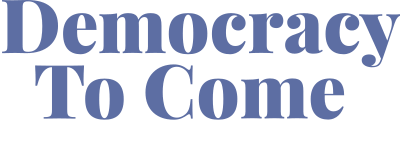Publications
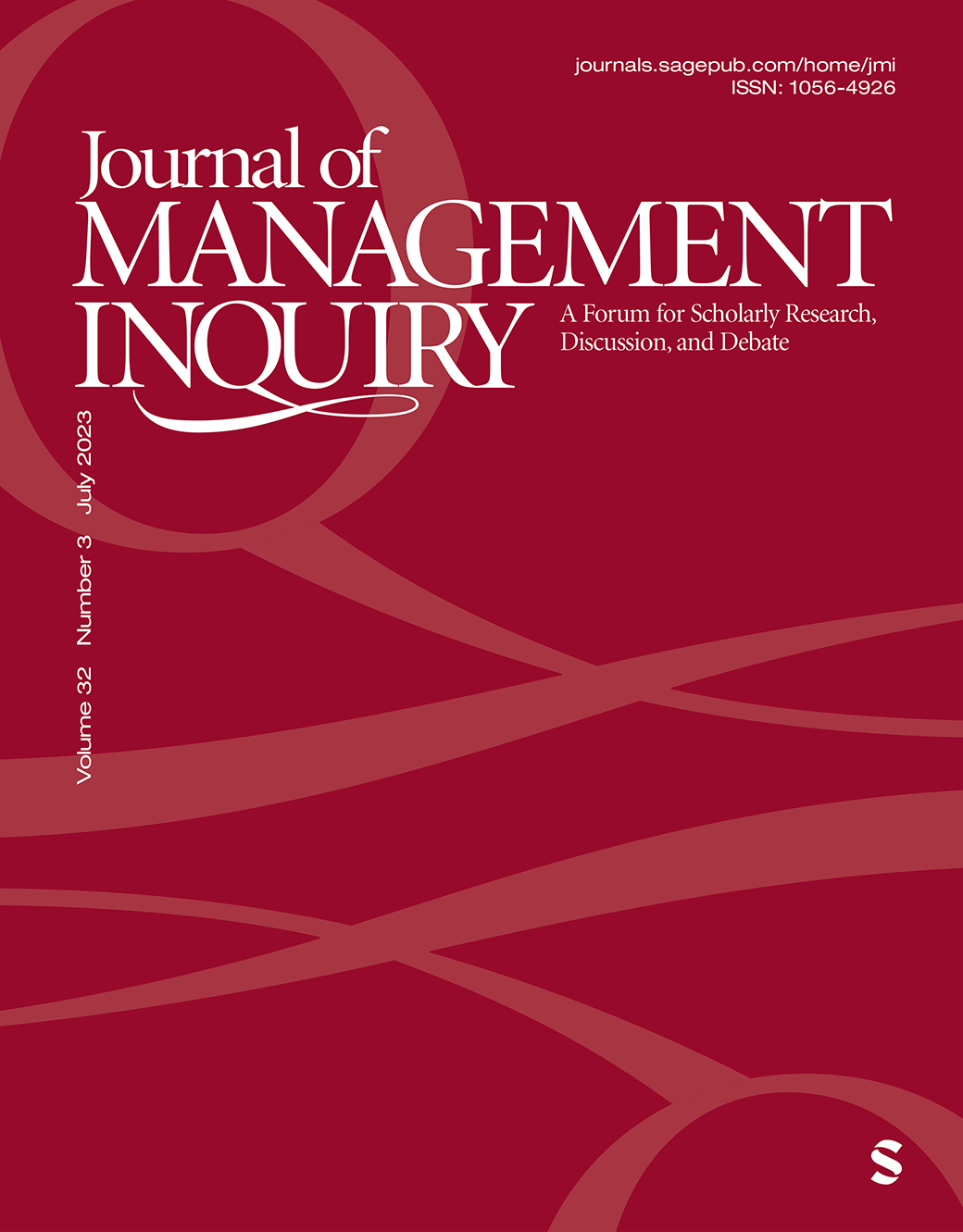
‘Running towards the Bullets’: Moral Injury in Critical Care Nursing in the COVID-19 Pandemic
Abstract The COVID-19 pandemic placed unprecedented strain on healthcare professionals around the globe, particularly those working in intensive care units. It was reported that instances of moral injury – a betrayal of what is ethically right by those in positions of power
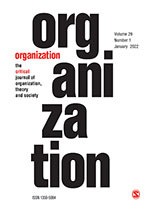
Creating meaningful connections: An experiment in practically engaged CMS
Abstract Can meaningful connections between academics, consultants, and practitioners of workplace democracy be created to bring about critically inspired change? This article presents an exploration of our experiment in producing a practical and engaged form of Critical Management Studies (CMS) through a
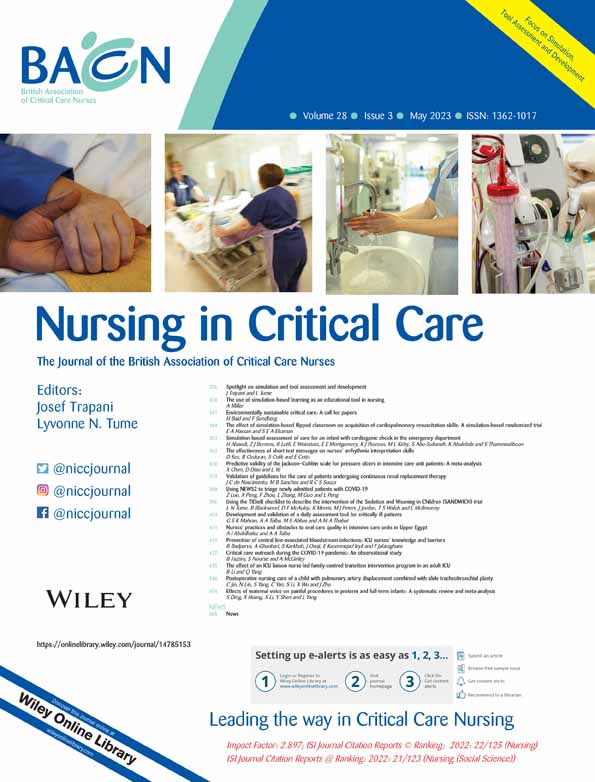
The impact of COVID-19 on mental health and well-being in critical care nurses – a longitudinal, qualitative study
Abstract Background: The COVID-19 pandemic has had both a psychological and physiological effect on the human race. For those working in health care, particularly in critical care, the pandemic has put unprecedented strain on staff. Witnessing suffering during crisis in an organizational

Toxic absence: Why Leader Presence Matters in Times of Crisis
Aim(s) – This study examines the importance of senior-leader presence on the ‘front-line’ in times of crisis. Background – The COVID-19 pandemic placed unprecedented demands on nurses charged with delivering critical care. Extant research suggests that the active presence of ward level leaders has

Emotional Labour: Concept and Practical Categorizations in Light of Covid Critical Care Nursing
This chapter appears in Lisa Herzog and Benedicte Zimmerman’s edited book Shifting Categories of Work. It considers the changing nature and recognition of emotional labor as a category of work. Over 40 years of scholarship have tracked and conceptualized emotion at work; marking

Life During Furlough: Challenges to Dignity from a Changed Employment Status
In response to the COVID-19 virus, the UK government introduced the Job Retention Scheme in March 2020. The scheme, a novelty in the United Kingdom, provided income support to those furloughed from work. In this paper, we examine how individuals in several
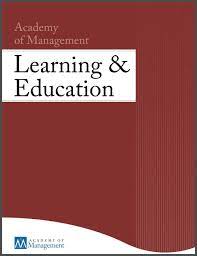
Inclusion and exclusion in management education and learning: a deliberative approach to conferences.
Unconferences are non-hierarchical, participant driven, self-managed meeting formats which seek to avoid top-down hierarchical knowledge transmission found within traditional conferences. This article explores how unconferencing, which aspires to the participatory ideals of Habermasian deliberative exchange, can contribute to inclusivity within conferences and

Learning to “Live the Paradox” in a Democratic Organization: A Deliberative Approach to Paradox Mindsets.
Paradox mindsets have been proposed as a way of increasing capacity to deal with the competing tensions that present themselves in organizational life. It has been argued that having a paradox mindset can help individuals to work creatively and productively with tensions

“Why Sit Ye Here and Die”? Counterhegemonic Histories of the Black Female Intellectual in Nineteenth-Century America.
This paper examines the work and lives of black female activist intellectuals in the years before the formation of the National Association of Colored Women’s Clubs (NACWC) in 1896. Looking deeper at arguments originally made by Maria Stewart concerning the denial of
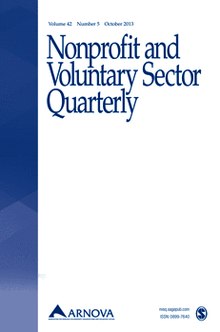
Nonprofits as Schools for Democracy: The Justifications for Organisational Democracy within Nonprofit Organisations
Nonprofit organizations are often claimed to be schools of democracy: “that produce citizens able and ready to participate in society” (Dodge & Ospina, 2016, p. 479). This claim is predicated the external role nonprofits play in producing democracy, particularly by engendering civic
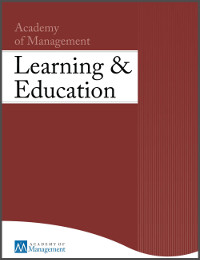
Organizational Readiness – Culturally Mediated Learning Through Disney Animation
We develop the notion of organizational readiness, a construct that describes the anticipatory expectations about future organizational life that children develop as they absorb the cultural influences to which they are exposed. We conduct our analyses through an exploration of the depictions
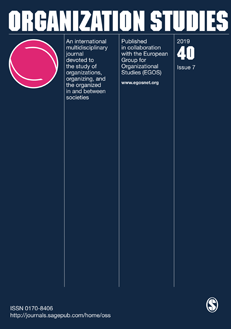
Whistle While You Work? Disney Animation, Organisational Readiness and Gendered Subjugation
This paper introduces the concept of ‘organizational readiness’: socio-cultural expectations about working selves that prepare young people (albeit indirectly and in complex and multi-faceted ways) for their future life in organizations. This concept emerges from an analysis of Disney animations and how
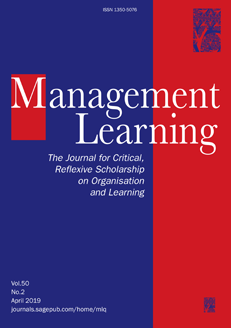
Non-Domination, Contestation and Freedom: The Contribution of Philip Pettit to Learning and Democracy in Organisations
This article provides a reading of the civic republican ideas of the political philosopher Philip Pettit in order to make new contributions to learning within organisational life. Our aim is to achieve non-domination in the workplace, and we suggest how Pettit’s work,
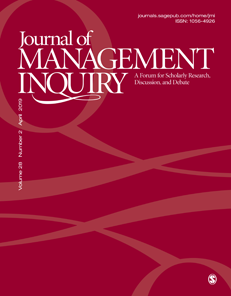
Doing Free Jazz and Free Organizations, “A Certain Experience of the Impossible”? Ornette Coleman Encounters Jacques Derrida
The French philosopher Jacques Derrida has had a profound influence on many areas of organization theory over the last twenty years; not something that could be said about the jazz musician, Ornette Coleman (a central figure in the Free jazz movement). Derrida

Culture, Community and Cognition: A Vygotskian Foundation for a Republican Approach to Deliberative Democracy
Modern accounts of deliberative democracy have predominantly been defended from within the liberal tradition. The first generation of deliberative theorists, John Rawls, Jurgen Habermas and Amy Gutmann, all approached this subject from a philosophically liberal perspective. Those that followed them and built
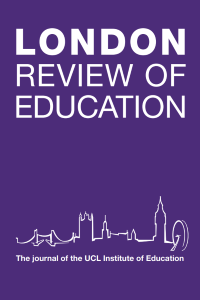
Raised aspirations and attainment? A review of the impact of Aimhigher (2004–2011) on widening participation in higher education in England
Aimhigher was discontinued on 31 July 2011. This paper reviews the literature analysing its contribution to widening participation to higher education in the UK. Successes of Aimhigher are considered alongside its challenges; particularly the necessity to situate policy within the diverse demands
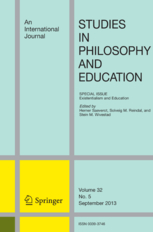
Deliberative Democracy and Emotional Intelligence- An Internal Mechanism to Regulate the Emotions
Deliberative democracy, it is claimed, is essential for the legitimisation of public policy and law. It is built upon an assumption that citizens will be capable of constructing and defending reasons for their moral and political beliefs. However, critics of deliberative democracy
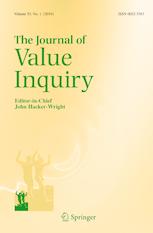
Motivating Reflective Citizens: Deliberative Democracy and the Internal Deliberative Virtues
Deliberative democracy involves the consideration and justification of the various reasons on which we base political decisions.1 It is a political framework by which citizens can discuss their beliefs and values and through deliberation find common ground on the important issues which
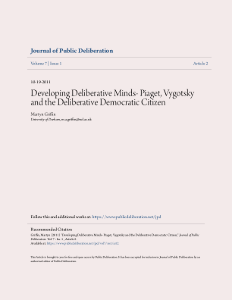
Developing Deliberative Minds- Piaget, Vygotsky and the Deliberative Democratic Citizen
The Piagetian account of development has been extremely influential in the deliberative democ- racy literature. It has been either explicitly or implicitly assumed by the majority of theorists working in this area. It encourages deliberative democrats to make at least four key
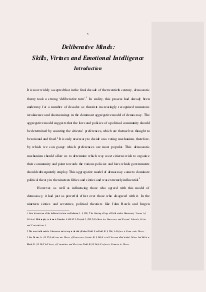
Deliberative Minds: Skills, Virtues and Emotional Intelligence of the Deliberative Democratic Citizen
Over the past two decades deliberative models of democracy have become increasingly popular. There is a growing acceptance that citizens should have the opportunity to directly shape the laws and policies that govern their lives. It is hoped that increased deliberation will
